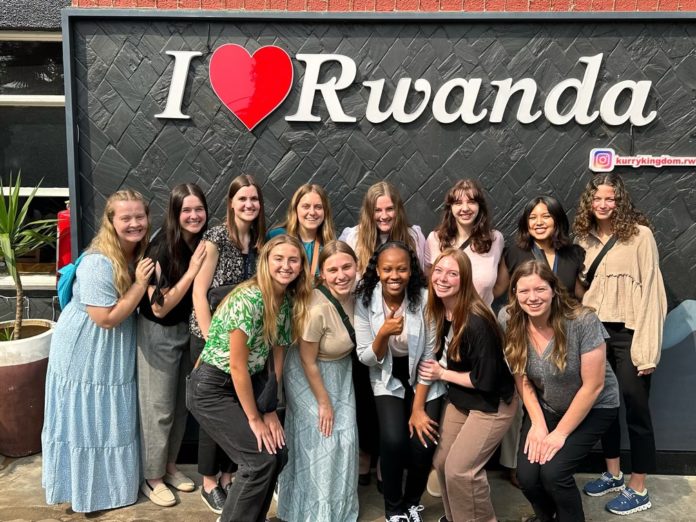
By Shelby Peck | Staff Writer
During the Wintermester, faculty and students from the Department of Communication Sciences and Disorders traveled to Rwanda to complete clinical studies as part of a new relationship between Baylor’s health programs and Africa New Life Ministries.
The trip spanned from Jan. 3 to Jan. 14 and included an array of undergraduate and graduate students working alongside one another to spend time in a local day care, experience a safari and learn about Rwandan culture.
“The people of Rwanda are intelligent. They’re highly resilient. They’re goal-oriented. Getting to partner with them was a privilege, and we learned just as much as they learned,” Nadine Welch, clinical associate professor of Communication Sciences and Disorders, said.
Welch said the program began in 2019 when faculty from the Department of Communication Sciences and Disorders went on a “vision trip.” A partnership with Africa New Life Ministries was established, and Welch was able to visit Rwanda on a follow-up trip in October 2019.
“The public health and nursing trip went in the summer of 2022, and that was the first trip where we brought students. This trip in January with CSD students was a second leg,” Welch said. “It’s a collaborative effort between all parties with some research involved.”
The purpose of the January trip was to examine the basic health, wellness and overall development of children in Rwanda. One of the ways this was accomplished was through assessments administered in day cares run by Africa New Life.
“We did some assessments in terms of getting their initial starting points and also partnership teaching with the workers in the day care,” Janet Sanker, clinical assistant professor of Communication Sciences and Disorders, said. “We did some literacy implementation within our group treatment.”
Communication Sciences and Disorders students and faculty also spent time with the mothers of the children who attend the day care through Africa New Life’s women empowerment program. Sanker said the program provides women with vocational training, spiritual guidance and the opportunity to send one of their children to day care.
“They set up services to serve the whole person,” Welch said. “They say they serve their children with two hands — one to serve their needs and the other to teach the Gospel.”
Sanker said most of the mothers and their children did not speak English, so the faculty and students had to adjust their communication methods to establish trust and relationships without the use of verbal words.
“Holding them, smiling, playing, being there and being present with them was such a powerful way to learn how to communicate,” Sanker said. “It was a lot of being present with them and not a whole lot of language being shared.”
She said the preparation for the trip required much prayer, discernment and willingness to serve. While the faculty and students engaged in speech and language training for the testing they would complete, Sanker said they also had to learn about cultural differences.
Students traveling to Rwanda as part of the trip were required to read “When Helping Hurts” by Steve Corbett, a book recommended to most partners of Africa New Life, as well as “Cross-Cultural Servanthood” by Duane Elmer.
“Those just go into what it means to serve globally and domestically, but also thinking about how to be compassionate and sensitive to those you are serving,” Sanker said. “That you go into it with a servant’s heart to learn from them the same way you’re going in to help them.”
She also said the trip taught her great humility as she saw the resourcefulness, resiliency and “passion for the Lord in fellowship and community” present in Rwandan culture. Sanker said she was also deeply impacted when taught about the forgiveness Rwandans offer one another after the Rwandan genocide, which according to the United Nations website began in 1994 as an outpour of conflict between the Tutsi and Hutu peoples.
“It was one thing to read about it,” Sanker said. “Just to see the personal testimonies from individuals who lived it and are dealing with it and healing from it, it’s a beautiful story of healing and forgiveness…understanding how everybody fits in this world together to move forward.”
Welch said she encourages students who are interested in pursuing a study abroad experience such as the Communications Sciences and Disorders trip to Rwanda to ask questions and get connected. She said they should talk to people who have traveled to places in which they are intrigued to understand the world in terms of their calling and skills for service.
“No matter what country, interest, it’s a really important part of your higher education journey that you experience another culture firsthand,” Welch said.
Welch said she invites students to attend the Study Abroad Fair on Feb. 21 being held during Dr Pepper Hour. She said she hopes the Communications Sciences and Disorders trip to Rwanda can be repeated next January. Goals for the next journey will differ and be formulated based on the results of the testing administered by the students and faculty who attended the January 2023 trip.
“Leaving while only knowing this Baylor experience is obviously a true growing point for anybody,” Sanker said. “To go beyond Baylor and know how much what you’re learning here can impact the rest of the world is critical for any student.”





